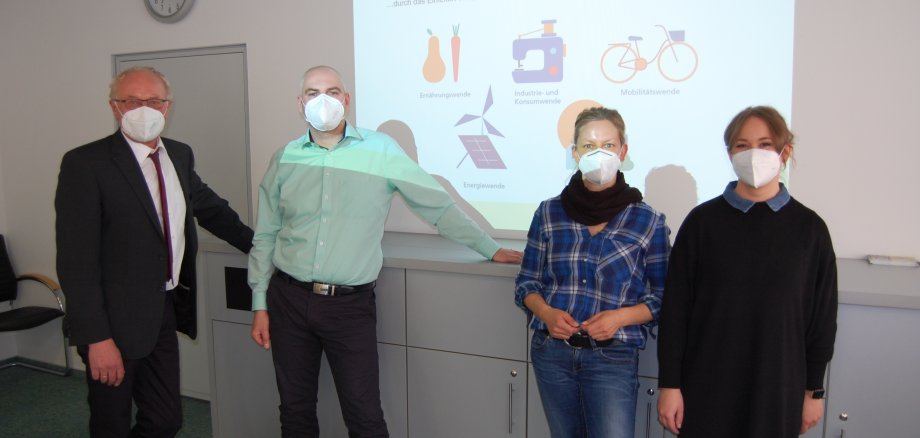Against climate change: District Administrator sets up "Climate Team
Current events such as the enormous heat wave in the north-west of the USA, storm-induced landslides in Japan or the accumulation of extreme weather situations with enormous amounts of precipitation in Central Europe show that the effects of climate change are already omnipresent. Time to act is running out; the federal government has set the year 2045 for achieving its climate goals. The federal states, districts and municipalities in Germany are also increasingly developing concepts to be able to cope with climate change.
However, the question remains whether local and regional strategies can make any difference at all in the face of a global challenge. District Administrator Dr Reinhard Kubat takes a positive view and has therefore already appointed a climate team in 2019 to raise awareness, develop strategies and mobilise people. The three-member working group includes biologist Tanja Müller (Village and Regional Development Department), geologist Kim Peis (Environment Department, Head of Geopark) and energy manager Nico Wirth (Building Management Department).
"In tackling climate change and the changes it is triggering, we need to take people with us," said the district administrator. "For this reason alone, local and regional approaches are extremely meaningful, because they make clear what each and every one of us can do to keep our earth worth living on and to make humanity viable".
The climate team started its work about two years ago. Although planned information events and an exhibition could not take place due to the pandemic, the "climate savings book" published a few weeks ago makes it clear that the trio has already done intensive work. The district administrator has also already presented the climate team and its work at a mayors' service meeting, because the municipalities must be brought on board as partners for the implementation of local strategies.
"All our efforts must be directed towards not exceeding the critical point of a maximum climate warming of 1.5 degrees, because from 2 degrees or even higher rates of increase, the consequences become uncontrollable," Kubat explains. "So-called tipping points will be reached, which must be avoided at all costs, as they could be irreversible. For example, the melting of the polar ice caps, the thawing of the permafrost zones or the change in global ocean currents."
The motto for the strategy is "transformation instead of repair". This can be achieved by initiating certain "changes" on the ground: Nutritional turnaround, consumption turnaround, mobility turnaround, energy turnaround as well as heating and housing turnaround are the keywords. The district administrator in Waldeck-Frankenberg wants to achieve this "transformation" by 2035 if possible, but by 2038 at the latest. One possible way to achieve this could be the establishment of an inter-communal network to which all relevant actors in the region belong and which formulates goals and develops strategies. This should happen within the next two years until 2024.
In a second phase, which is planned from 2024 to 2027, the implementation of the climate protection concept is to begin. As District Administrator Dr Kubat explained, this will specifically involve the creation of further climate protection offices, support for local partners and the development of further concrete goals in the administration. In a third phase, which is to run from 2027 to 2036, the concrete implementation of the strategies will begin, i.e. the realisation of the "turning points" presented at the beginning (nutrition, mobility, housing...).
"These are ambitious goals, but it is not up for debate whether we want to implement them - the continued existence of the world as we know it depends on whether we can actually achieve them within the set timeframe," the district administrator made clear the seriousness of the situation. "This will be a hard slog and, of course, cannot be had for free". The district administrator expects additional costs of 5 to 6 million euros over a period of 15 years. However, due to high subsidy rates of up to 75 per cent on the part of the federal government and the state, the net costs for the district will be significantly reduced.
"I emphasise once again that we do not have a choice here, whether we want to or not," Kubat made unequivocally clear. "Leading scientists agree: we are living in a new geological age, the Anthropocene - humans have become the biggest influencing factor on Earth. From mountains of rubbish on Mount Everest to microplastics in the Mariana Trench, our traces are everywhere."
A geological epoch is traditionally determined by the characteristics of its rock layers. Since our sediments increasingly contain "technical fossils" such as aluminium, concrete and carbon compounds from the combustion of fossil fuels, the stratigraphic, i.e. the division of the Earth's history that follows the age sequence of the rock layers, must be supplemented by a new era. "If we do not act now, the climate crisis will become a global catastrophe that could ultimately mean the end of civilisation, perhaps even of humanity," the district administrator fears.
